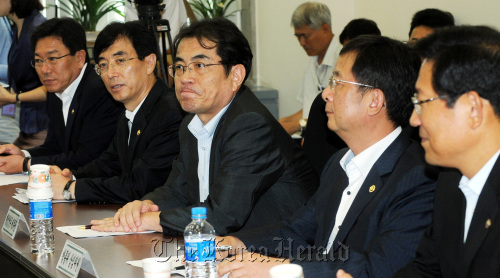In the wake of the recent massive leaks of personal information from major portals, attention has been focused on whether or not to abolish the real-name system on the Internet.
In a government-ruling party meeting held on Thursday at the National Assembly, the Ministry of Public Administration and Security discussed the possibility of phasing out the online real-name system, according to officials.

Government officials hold a policy meeting with ruling party lawmakers on whether to phase out online real-name verification rules Thursday at the National Assembly. (Park Hyun-koo/The Korea Herald)
The report also included banning private enterprises from using people’s residence registration number without consent.
“No conclusion has been drawn on the issue so far,” said a ministry official.
The ruling Grand National Party spokesperson also denied any plan to abolish the current real-name system.
The real-name system was introduced 2007 to promote a sense of responsibility among netizens, as a measure against the increasing damage caused by malicious online rumors.
Users are required to register their real name and residence registration number in order to join and post content on official websites.
The system, however, faced blame that it led to the leak of the personal information of millions of Koreans.
Recently, Cyworld and Nate, both major communication portals here, were hit by hacking attacks that leaked the personal information of some 35 million users, including their name, phone number and residence registration number.
The government-ruling party meeting, chaired by the ruling Grand National Party’s policy committee chairman Lee Ju-young, was attended by vice ministers of the public administration, knowledge economy, defense and culture ministries.
By Bae Hyun-jung (tellme@heraldcorp.com)



![[Herald Interview] 'Amid aging population, Korea to invite more young professionals from overseas'](http://res.heraldm.com/phpwas/restmb_idxmake.php?idx=645&simg=/content/image/2024/04/24/20240424050844_0.jpg&u=20240424200058)


